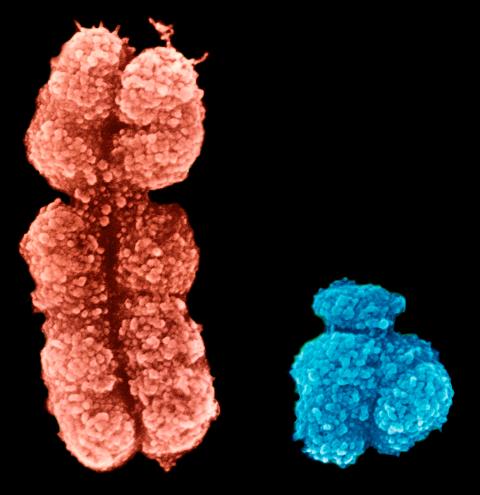Losing the Y chromosome
Losing the Y chromosome

In humans, biological sex is determined by the chromosomes X or Y. People having a Y chromosome are typically male, as this small chromosome –which evolution seems to be doing away with– contains a gene which determines the formation of male sexual organs in the embryo.
However, despite its small size, the Y chromosome is an important one. So much so, that losing it might result in increased likelihood of suffering certain kind of cancers, such as bladder cancer or Alzheimer’s disease. Worse still is that, with aging, loss of this chromosome is relatively common, which increases the odds of things going wrong for males with increasing age.
To determine the level of involvement of Y chromosome loss in bladder cancer growth, Abdel-Hafiz and colleagues first 1 determined its loss using the expression of genes located in it in bladder cancer cells before moving on to doing the same in human samples. The human samples were split into two groups: one included samples from patients treated with immune checkpoint inhibitors (drugs which boost the immune system’s capacity of killing cancer cells) and another of patients who did not receive such drugs.
Interestingly, they found that untreated patients with chromosome loss had worse prognosis than those who maintained their Y chromosome; in addition, treated patients with chromosome presence had better outcomes than the ones who had lost it. To further investigate the underlying mechanism, they grew tumour cells in vitro, both with and without Y chromosomes. Interestingly, both grew equally fast. However, when immune cells (T cells) were co-cultured with the tumour cells, tumour cells without the chromosome grew much faster, probably because they impaired T cell function.
This research is very interesting as it offers new insights into the role of the Y chromosome in bladder cancer growth in males. However, this is just a first step. Next, identifying the specific genes responsible for the interaction with the immune system is necessary to be able to develop a treatment that can mimic its activity and help fight tumour growth further than immune checkpoint inhibitors.
References
- Abdel-Hafiz, H.A., Schafer, J.M., Chen, X. et al. (2023) Y chromosome loss in cancer drives growth by evasion of adaptive immunity. Nature doi: 10.1038/s41586-023-06234-x ↩